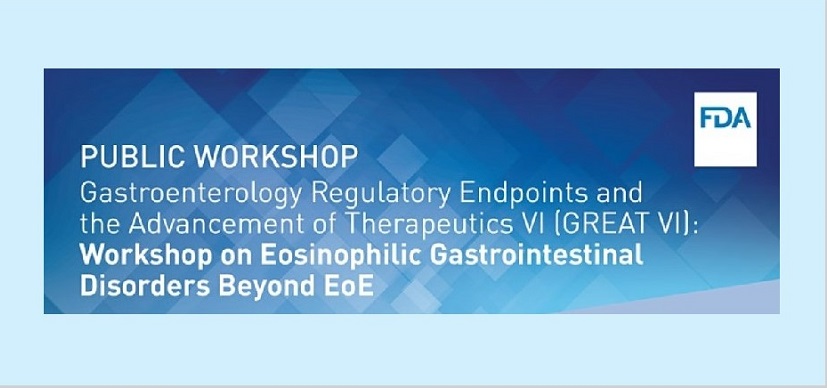Preparing for Progress on Eosinophilic Gastrointestinal Diseases Beyond Eosinophilic Esophagitis
Post Date: January 7, 2022 | Publish Date:

Post written by Shawna Hottinger, MS, ELS.
The next wave of research for eosinophilic gastrointestinal diseases (EGID) will focus on under-studied conditions that affect the body beyond the esophagus, according to a recently published article by Marc Rothenberg, MD, PhD, and colleagues.
The article, entitled “Impressions and Aspirations from the FDA GREAT VI Workshop on Eosinophilic Gastrointestinal Disorders Beyond Eosinophilic Esophagitis and Perspectives for Progress in the Field,” appears online in the Journal of Allergy and Clinical Immunology. It recaps the findings of a scientific workshop hosted by the U.S. Food and Drug Administration (FDA) on July 21, 2021.
Eosinophilic gastrointestinal diseases (EGID) are rare allergic conditions of the gastrointestinal tract, with eosinophilic esophagitis (EoE) being the most common and studied. Importantly, diagnosis of EGID is often delayed. The workshop discussed the disease characteristics, natural history, and endpoints to assess treatment benefit in patients with EGID beyond EoE, referred to as non-EoE EGID.
(To view a meeting recording, visit https://www.fda.gov/drugs/news-events-human-drugs/gastroenterology-regulatory-endpoints-and-advancement-therapeutics-vi-great-vi-workshop-eosinophilic )
Notably, non-EoE EGIDs, such as eosinophilic gastritis, eosinophilic enteritis, and eosinophilic colitis, are understudied relative to EoE. The workshop included contributions from researchers in allergy, immunology, epidemiology, gastroenterology, pathology; clinicians serving adults and children; and stakeholder representatives for the FDA, industry, and patient advocacy groups.
Key points from the meeting include:
- Diagnosis of non-EoE EGID can be challenging, as eosinophils are resident cells during homeostatic healthy conditions in the non-esophageal portions of the gastrointestinal tract. Nevertheless, eosinophil thresholds for diagnosis, especially in patients with eosinophilic inflammation of the stomach and duodenum, and more comprehensive disease manifestation assessments are steadily being refined to permit the assessment of meaningful benefit in clinical practice and in clinical trials.
- Standardized nomenclature for clinical and research purposes for non-EoE EGIDs is fundamental for further progress and is being developed.
- The non-EoE EGID field is expanding, and data related to diagnosis, natural history, and pathogenesis are rapidly emerging and transforming clinical practice.
- As chronic diseases associated with substantial morbidity, health care utilization, and poor quality of life, EGIDs are in desperate need for efficacious and FDA-approved drugs.
- Potential differences in assessment standards, diagnostic and eligibility criteria, and outcome measures between clinical practice and those suitable for regulatory purposes to support drug development should be considered prior to trial initiation to inform design and promote the interpretability of the results to support the assessment of clinical benefit.
Rothenberg and colleagues stated that several next steps that would benefit the non-EoE EGID field, including:
- Finalizing and implementing clinical consensus nomenclature and diagnostic criteria (e.g., histopathologic criteria and thresholds),
- Further characterizing the natural history for these diseases,
- And developing curriculum for medical and other health professional schools, including continuing medical education (CME), and maintaining certification (MOC) programs tailored to clinicians to understand EGID.
Learn more about ongoing research at the Rothenberg CURED Lab







